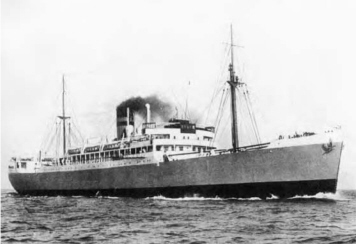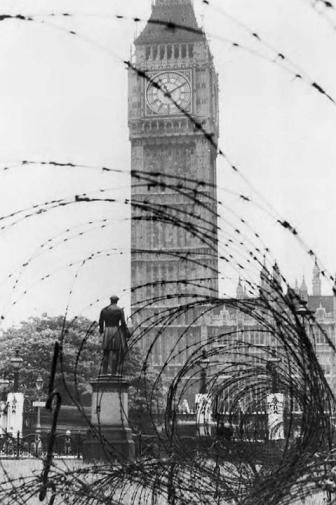
SS Umgeniwas a handsome five-year-old 7000-ton merchant ship with passenger accommodation, much more comfortable than a regular troopship, and David shared a first-class cabin with two others. A good sailor, he was untroubled by typical Bass Strait weather, which laid other men low and sent soup, glasses and cutlery to the floor. Speculation about destination ended. They were heading east. Surely bound for Britain. David was jubilant. But very aware that the rocky Bass Strait islands were the last view of Australia he might ever see. Enemy submarines had been active in the Tasman Sea, so life jackets had to be carried at all times, and every man served on daytime submarine watch and night blackout patrol.
Seven days after leaving Adelaide, Umgeni made landfall in New Zealand. For the first time David saw the mighty Avro Lancaster aircraft, the only one in Australasia. Queenie, the Lanc, was visiting from Britain to raise funds with demonstration flights. She was breathtaking. So well
The mighty four-engined Avro Lancaster (AWM neg. no. P00811_003)
proportioned, so much bigger and more powerful with her four engines than any aircraft he had yet seen. She banked and turned so effortlessly on her long elegant wings.
Although David had aspired to be a fighter pilot, he was realistic. With Bomber Command’s high casualties, most of the new aircrew would probably be sent to fly heavy bombers. Now he hoped he would be allocated to Lancasters. ‘That’s the kite I want to fly,’ he told himself. ‘She’s magnificent.’
On his 21st birthday David took eight friends, including Tasmanians Peter Lord, Ian Vickers, Gordon Lawson and Ron Leonard, to dinner at the best hotel in Wellington. They were amazed to find eighteen choices on the menu, in contrast to Australian austerity.
‘Tuck in, boys, and make the most of it,’ David urged his guests. ‘We won’t be getting meals like this in Britain.’
They needed no second urging.
When David asked for a bottle of wine the head waiter’s surly response was, ‘Don’t you know there’s a war on?’ All the young men in Air Force blue, already so far from home, burst into laughter.
Umgeni was delayed for almost four weeks in three ports because waterside workers refused to handle frozen lamb in wet conditions. ‘Perhaps we can swing the lead too, and refuse to fly when it’s raining!’ the airmen joked. But it gave them plenty of opportunities to enjoy renowned Kiwi hospitality and to explore. Eager to experience Maori culture, arriving at Waitara, a traditional village and ancient pa, on the occasion of a great gathering, David was moved that the Australians were welcomed as guests of honour, greeted in the languages of the elders.
During their last week in New Zealand, David felt unwell, but he did not report sick for fear of being offloaded. When Umgeni finally sailed, the ship’s doctor diagnosed jaundice and David was confined to bed on a diet of boiled fish, bread and jam and black coffee for ten days. ‘What rotten luck,’ his mates sympathised.
When at last he was allowed on deck to watch gunnery practice and take part in lifeboat drill he was glad to enjoy the sunshine and glittering expanse of the azure blue Pacific. Before reaching the Equator, they saw the Southern Cross, now low on the horizon, for the last time. Haunted by the sight of an empty lifeboat drifting on the watery waste, each man wondered if he would ever see the familiar constellation again. They sweltered in stifling heat, thunderstorms and torrential tropical rain before Crossing the Line, which gave the young warriorsin-waiting a chance to let off steam.
Almost eight weeks after leaving Adelaide, Umgeni reached Balboa, the Panama Canal’s Pacific entrance. During the fifty mile, day-long passage David marvelled at the system of locks and lakes, an amazing feat of engineering which had cost so many lives.
Reaching Colon on the old Spanish Main, they were eager for their first taste of a really foreign port. A night out in the brightly lit old town was different from anything they had known, with its lively Latin atmosphere of night clubs, Spanish dancing and music, its cosmopolitan crowds, horse-drawn cabs, narrow streets lined with Spanish-style houses, and open taverns and shops. Returning to the ship, however, was tricky, cruising from one blacked-out vessel to another searching for the right one. In the morning they discovered that Colon was not so glamorous by day, just sleazy and squalid. Unnerving, too, with large American cars driving on the right-hand side.
Umgeni sailed now as Commodore’s flagship in the first row of a ten-ship convoy, which could only travel at the speed of its slowest vessel, a vulnerable 7 knots. U-boat activities had escalated in the Caribbean and only four days earlier a convoy had lost the equivalent of three Umgenis. So everyone was extra vigilant on submarine watch.
As radio communication was forbidden, flags and Aldis lamp signalling were used, and the ship’s guns were manned at all times. The tension increased after detectors twice picked up submarines in Torpedo Lane, the narrow passage between Jamaica and Haiti where the Commodore’s ship had been sunk on his last two trips.
Three submarines were sighted during one evening, but then black cloud descended, obscuring the moon and reducing the danger of attack. Next morning no convoy vessels had become statistics to add to the grim tally of over 400 lost in Torpedo Lane. The airmen joked about their good Aussie luck. ‘The Japs didn’t get us in the Pacific, and Jerry hasn’t got us here. So we’ve got to be third time lucky in the Atlantic!’ But secretly all were aware that at any moment their number could be up.
The next brief landfall was Guantanamo Bay, Cuba, a US naval base. It was a desolate spot and the men were not sorry there was no shore leave. Joining a bigger fifteen-ship convoy, helping to screen twelve oil tankers from attack, made Umgeni even more vulnerable. Only the Caribbean’s indigo blue and magnificent sunsets provided relief from tension, unrelenting heat and humidity. Twelve long days and nights after leaving Colon, heat changed into cold wind. Heavy fog enveloped the convoy and ships blew their sirens in morse to indicate position. It was eerie.
But intact and unharmed, the convoy entered New York Harbour. The harbour was dominated by the gigantic figure of the Statue of Liberty and crowded with shipping flying the flags of Britain, USA, France, Netherlands, Norway, Sweden and Panama. From the Little Apple of Launceston to the Big Apple was a stupendous transition. The long watches day and night for weeks at sea had given David plenty of time to reflect on the meaning of life and the question of death. Now, the hurry, bustle and noise of this huge city, with its Manhattan skyscrapers dwarfing the mortals below, seemed overwhelming and superficial. But David and his mates made the most of the long hot days to take in new experiences, using slot machines for food and drink, eating hamburgers and fries, and sightseeing. They were particularly impressed by New York’s showpiece, the recently completed Rockefeller Center, with elevators travelling up seventy floors at phenomenal speed to a breathtaking view from its observation deck. David wrote home, Among its army of maintenance personnel, one man’s full-time job was to pick up chewing gum!
Shopping in well-stocked department stores for items unobtainable in beleaguered Britain, most men bought silk stockings, but David also bought swimming trunks and a silver propelling pencil. And mindful he might find himself shot down over France, a second-hand copy of Alexandre Dumas’ novel The Three Musketeers, to brush up his French.
A home visit on leafy Long Island provided a welcome break, and a chance to reconnect with the earth and green and growing things. The kindly couple, who provided hospitality to many servicemen, kept in touch for the next thirty years.
After five days in New York, Umgeni left on the hazardous Atlantic crossing as part of an even bigger convoy proceeding at 10 knots. On watch early next morning David had the uncanny experience of seeing a notorious Newfoundland fog swallow all thirty-nine ships, including a merchant ship converted to aircraft carrier with fifty-one Thunderbolt fighters lashed to her deck. After another fourteen ships joined, dense fog caused several collisions. Then fog gave way to driving rain and icy winds, and rising seas forced the convoy to slow to an anxious 4 knots, to allow twenty-five ships separated overnight to catch up.
Ten nerve-wracking days out from New York the convoy was split to allow the fastest ships, including Umgeni, to proceed at 12 knots. Next day, it was finally disbanded, and each ship headed for its own port. Grateful that none had been lost, even the most hardened atheists secretly murmured ‘Thank God!’ In the calm Irish Sea, such a relief after the fierce Atlantic, Umgeni made 15 knots. On Friday 3 September, the fourth anniversary of the declaration of war, the Allies invaded Italy and Umgeni docked at Cardiff. That evening the young airmen staged an impromptu concert, a high-spirited celebration of their arrival in Britain after their three-month voyage.

SS Umgeni
